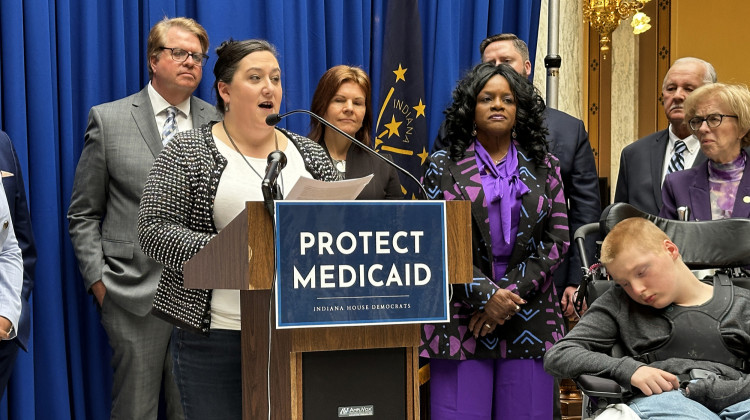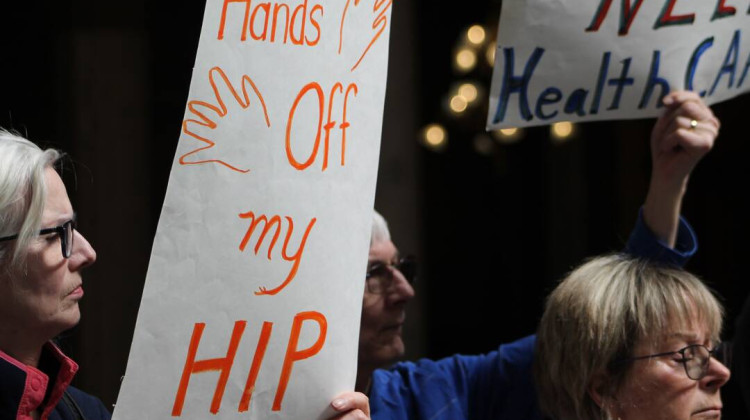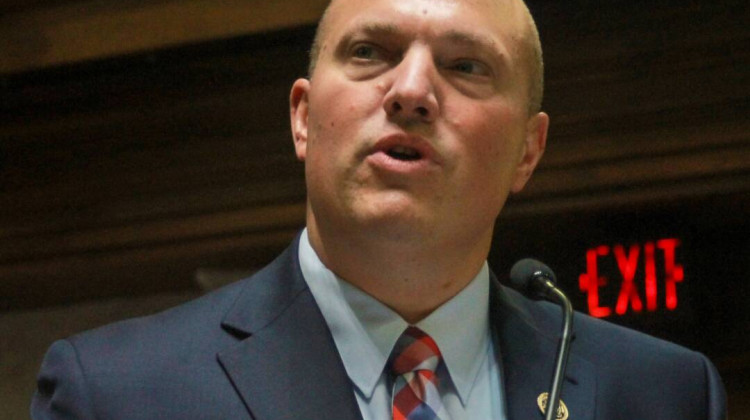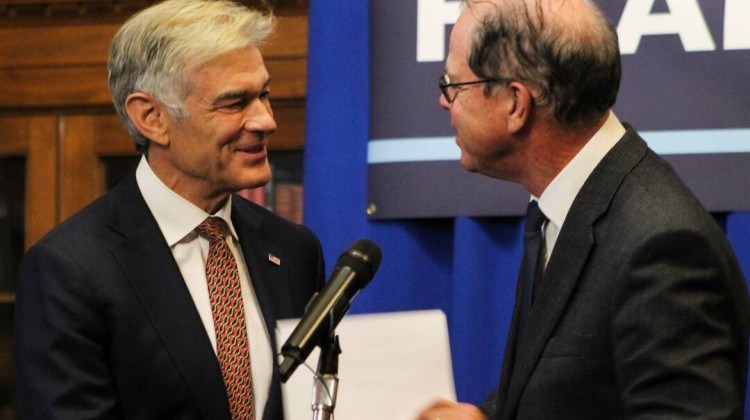
Jennifer Dewitt speaks at a Feb. 13 rally alongside House Democrats, calling for protections for families like hers to remain in the attendant care program.
Abigail Ruhman / IPB NewsThe Family and Social Services Administration plans to move forward with a significant change to a Medicaid program utilized by more than 1,600 children with disabilities — despite concerns from caregivers.
The agency responded to recommendations made by families of Medically complex children to the governor.
Indiana Families United for Care presented the Gov. Eric Holcomb and FSSA with recommendations to clarify the process, improve communication and address concerns around how the transition is being handled. The group requested FSSA delay the transition by 90 days to clarify the process to families and other stakeholders, as well as allow families the time to find the right Structured Family Caregiving provider.
The transition will continue as planned, according to FSSA.
FSSA said family caregivers will no longer be able to provide attendant care — instead shifting to the Structured Family Caregiving program on July 1.
The agency also responded to the other concerns the families raised in their meeting with the governor.
Indiana Families United for Care said FSSA is holding approvals for other waiver services "hostage" to lower or stop attendant care hours before the July 1 deadline.
FSSA said it began reviewing services plans in March to ensure “services requested are compliant with the CMS approved service definitions and consistent with the individual’s needs.” The service plan reviews were announced in January following the state’s $1 billion shortfall. FSSA said the longer review period is due to state staff being engaged in the process rather than receiving automatic approvals.
Medicaid members should still receive previously approved services during the service review process. If a service is denied, FSSA said the member can appeal the decision or resubmit a modified version of the service plan.
The families of medically complex children also made several recommendations to address transparency concerns and the state’s “woefully lacking” communication.
These included FSSA designating an ombudsman for families, providing written notification to families following a denial of services, publishing public versions of the waivers submitted to the federal government and frequently asked questions on the Medicaid strategies webpage.
FSSA said ombudsmen are designated in state statute, meaning it isn’t able to designate one. The agency also said it already has frequently asked questions on the web page available to the public. It posted the waivers on the Medicaid strategies web page, but said they have not been approved by CMS yet.
The parents had also requested FSSA release how individuals will be evaluated for the Structured Family Caregiving program, which pays legally responsible individuals based on a three-tiered system.
Shortly after those recommendations were sent to the agency and governor, FSSA updated families and individuals in an informational webinar. It said for individuals transitioning from attendant care to Structured Family Caregiving, their tier will be determined by the amount of authorized attendant care hours they had as of May 1.
FSSA said it is working to complete those assessments by May 30.
Join the conversation and sign up for the Indiana Two-Way. Text "Indiana" to 765-275-1120. Your comments and questions in response to our weekly text help us find the answers you need on statewide issues.
The agency did submit a change to CMS based on another recommendation from parents. The change would give caregivers of Medicaid members in the Structured Family Caregiving program access to respite, or short-term relief provided by a skilled care worker rather than the non-skilled respite currently offered.
Any additional information on the change will be provided through the state’s Medicaid strategies web page.
Indiana Families United for Care also asked the agency to reconsider its position on allowing legally responsible individuals to provide attendant care. It said the agency could put “an appropriate evaluation tool, guidelines, guardrails and a limit on LRI provided hours” in place.
The service is still allowed if care is provided by an attendant that is not a legally responsible individual, but FSSA said this transition strategy allows legally responsible individuals to provide services in a “fiscally responsible way” that is in compliance with the state’s approved waivers.
FSSA said it will be taking some actions to improve communication with individuals and families. It has been hosting training and informational webinars for care managers, but is adding webinars for individuals and families.
The webinars will be every other Wednesday until July 1 to provide updates for Medicaid members under the age of 59 currently on the Aged and Disabled waiver. Each one includes new information and updates.
-
Individual and Family Bi-Weekly Webinar for Aged and Disabled or TBI Waiver
May 15, 2024, 3-3:30 p.m. EST
-
Individual and Family Bi-Weekly Webinar for Aged and Disabled or TBI Waiver
May 29, 2024, 3-3:30 p.m. EST
-
Individual and Family Bi-Weekly Webinar for Aged and Disabled or TBI Waiver
June 12, 2024, 3-3:30 p.m. EST
-
Individual and Family Bi-Weekly Webinar for Aged and Disabled or TBI Waiver
June 26, 2024, 3-3:30 p.m. EST
Abigail is our health reporter. Contact them at aruhman@wboi.org.
9(MDAyMzk1MzA4MDE2MjY3OTY1MjM5ZDJjYQ000))
 DONATE
DONATE






 Support WFYI. We can't do it without you.
Support WFYI. We can't do it without you.